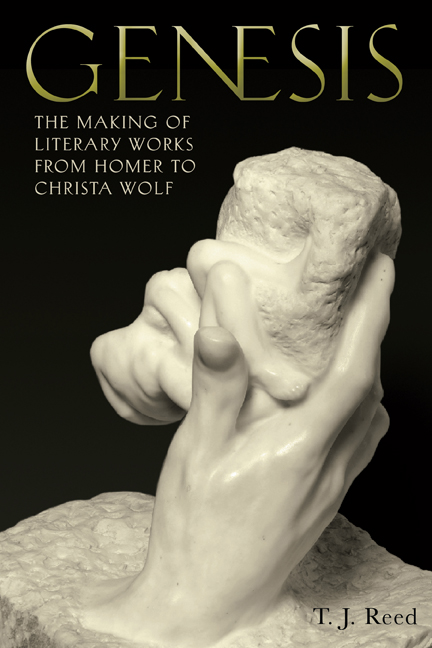Book contents
- Frontmatter
- Dedication
- Contents
- Note on Quotations and Translations
- Preface
- Introduction: Processes
- Part I Antiquity
- 1 Homer's Audiences: Shaping the Iliad (and the Odyssey)
- 2 Fourfold Genesis: The Bible between Literature and Authority
- Part II Early Modern
- 3 An Alphabet of Experience: Montaigne
- 4 Beginner's Luck: Shakespeare's History Cycles
- Transition—Tradition
- Part III Goethe
- 5 Cross-Purposes: Goethe's Faust
- 6 Occasions: Goethe's Lyric Poetry
- 7 Live and Learn: Werther and Wilhelm Meister
- Part IV Nineteenth- and Twentieth-Century German
- 8 Writing on the Run: Georg Büchner's Revolutions
- 9 “The Best-Laid Schemes…”: Thomas Mann Unplanned
- 10 Description of a Struggle: Kafka's Half-Escape
- 11 Atomic Beginnings: Brecht, Galileo, and After
- 12 Knowing and Partly Knowing: Paul Celan's Mission
- 13 Christa Wolf: A Fall from Grace
- Afterword
- Notes
- Bibliography
- Index
Introduction: Processes
Published online by Cambridge University Press: 16 September 2020
- Frontmatter
- Dedication
- Contents
- Note on Quotations and Translations
- Preface
- Introduction: Processes
- Part I Antiquity
- 1 Homer's Audiences: Shaping the Iliad (and the Odyssey)
- 2 Fourfold Genesis: The Bible between Literature and Authority
- Part II Early Modern
- 3 An Alphabet of Experience: Montaigne
- 4 Beginner's Luck: Shakespeare's History Cycles
- Transition—Tradition
- Part III Goethe
- 5 Cross-Purposes: Goethe's Faust
- 6 Occasions: Goethe's Lyric Poetry
- 7 Live and Learn: Werther and Wilhelm Meister
- Part IV Nineteenth- and Twentieth-Century German
- 8 Writing on the Run: Georg Büchner's Revolutions
- 9 “The Best-Laid Schemes…”: Thomas Mann Unplanned
- 10 Description of a Struggle: Kafka's Half-Escape
- 11 Atomic Beginnings: Brecht, Galileo, and After
- 12 Knowing and Partly Knowing: Paul Celan's Mission
- 13 Christa Wolf: A Fall from Grace
- Afterword
- Notes
- Bibliography
- Index
Summary
TO THE SYMPATHETIC OBSERVER, there is pleasure in watching something of beauty or value being made or coming spontaneously into existence. A blossom is a highpoint in a plant's evolution and a single year's cycle. Parents watch a child grow in the womb into what from the moment of birth will be a distinctive person. Literary works are likewise the product of a human organism and come into being in an analogous way, containing “a potency of life as active as that soul was whose progeny they are.” The metaphor of procreation will recur. More than one writer thinks of his work as his child, himself even as its mother, not so much a male attempt to appropriate woman's unique role as a sense that literary creation too is an unstoppable process from deep within.
So works are not just there like objects in a landscape. They have to begin and gradually grow into what they are. Not that objects in a landscape are “just there,” either. Eons of geological activity have created mountains and valleys, folds and faults. Everything has a history, and coming at it through its genesis is a way of understanding it in depth— understanding how a form has been shaped by traceable forces, so that even when it is the object of a discrete aesthetic perception, it is only one possible “still” within a continuous movement. Following that movement locates and illuminates the final form from many sides.
A work may take time and undergo all kinds of inner and external pressures and accidents on the way to its eventual form, assuming it ever finds one—for “ars longa, vita brevis.” Pascal's Pensées are a mass of slips left at his death, halfway to thematic ordering. Short of mortality, anything is possible—vision, revision, addition, deletion, alternative drafts considered and discarded, even abandonment as a fragment or a frankly admitted failure; everything is in flux. In an insight of Goethe's (who coined the term morphology for the science of evolving forms), “State is a foolish word, because nothing stands still, and everything is in motion.”
At the everyday level, readiness to understand another person's viewpoint is sometimes expressed as “I see where you’re coming from”—not simply where you now stand, but more illuminatingly how you reached that position, from what assumptions and principles and through what experiences.
- Type
- Chapter
- Information
- GenesisThe Making of Literary Works from Homer to Christa Wolf, pp. 1 - 16Publisher: Boydell & BrewerPrint publication year: 2020



